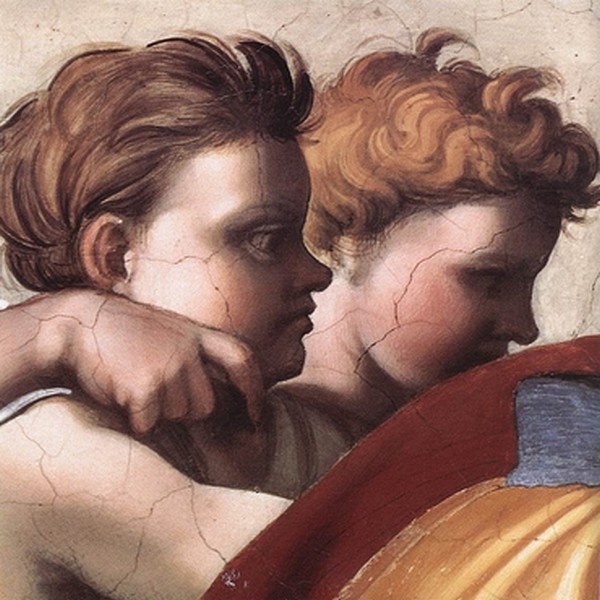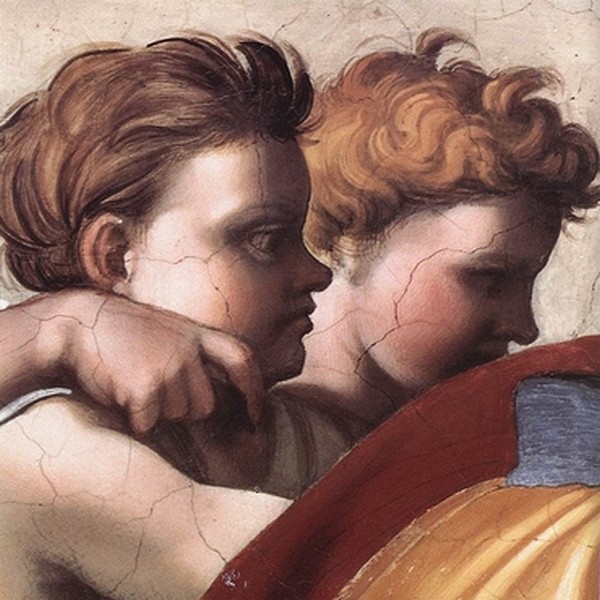
Michelangelo was an architect, a painter and a sculptor, but he was also a poet. It's said that he wrote poetry throughout his life, although only about three hundred poems (including sonnets, madrigals and rhymes) have been kept; most of which were written from 1529 when Michelangelo was in his fifties. Those poems were not published until 1863. Much earlier, in 1625, one of his great-nephews published some of them but he made some changes with a complete lack of judgment, the result was a completely careless edition. In 1900, William Wells Newell said regarding the poetry of Michelangelo in the introduction to his English translation of the sonnets and madrigals:
During Christmas 1896, a friend gave Wolf a volume of Michelangelo's poems translated to German by Heinrich Walter Robert-Tornow. The composer liked the poems so much that a large collection of Lieder was expected, according to his habit of reading a poet and then, composing, almost compulsively, one song after another until everything was fully said; as he had done previously with the twenty Lieder by Eichendorff, Goethe's fifty one or Mörike's twenty-two. But this time things turned out to be different.
1897 had a good start for Wolf. His friend Gustav Mahler was the Vienna Court Opera’s new conductor and promised him to premiere his opera Der Corregidor. Wolf's dream would be fulfilled at last! But Mahler wasn't be able to accomplish his promise during that season and they had to wait until the following one. That event utterly confused Wolf who had been suffering some health mental problems since he was very young. This suffering drove him definitely mad and he had to be institutionalized in a psychiatric hospital, where he remained until his death in 1902. Before then, Wolf wrote only three Michelangelos's Lieder which became his last work.
The three Lieder are Wohl Denk ich oft an mein Leben vergangnes (a verse from a longer poem, the Rhyme no. 5, Io crederrei, se tu fussi di sasso), Alles endet, was entstehet (which corresponds to the Rhyme no. 21, Chiunche to nasce morte arriva) and Fühlt meine Seele das ersehnte Licht (the XVII, Non so se s'è la desiata luce).
We are listening the 3rd Lied, performed by Hans Hotter and Gerald Moore, a great version . This is Michelangelo’s sonnet:
Non so se s'è la desïata luce
Del suo primo fattor, che l' alma sente;
O se dalla memoria della gente
Alcun'altra beltà nel cor traluce;
O se fama o se sogno alcun produce
Agli occhi manifesto, al cor presente;
Di sè lasciando un non so che cocente,
Ch'è forse or quel ch'a pianger mi conduce;
Quel ch'i' sento e ch'i' cerco: e chi mi guidi
Meco non è; nè so ben veder dove
Trovar mel possa, e par c' altri mel mostri.
Questo, signor, m'avvien, po' ch'i' vi vidi;
C'un dolce amaro, un sí e no mi muove:
Certo saranno stati gli occhi vostri.
Fühlt meine Seele das ersehnte Licht
Von Gott, der sie erschuf? Ist es der Strahl
Von andrer Schönheit aus dem Jammertal,
Der in mein Herz Erinnrung weckend bricht?
Ist es ein Klang, ein Traumgesicht,
Das Aug und Herz mir füllt mit einem Mal
In unbegreiflich glüh'nder Qual,
Die mich zu Tränen bringt? Ich weiß es nicht.
Was ich ersehne, fühle, was mich lenkt,
Ist nicht in mir: sag mir, wie ich's erwerbe?
Mir zeigt es wohl nur eines Andren Huld;
Darein bin ich, seit ich dich sah, versenkt.
Mich treibt ein Ja und Nein, ein Süß und Herbe -
Daran sind, Herrin, deine Augen Schuld.
Sent la meva ànima l'anhelada llum
de Déu, la qual ell va crear? És el raig de llum
d'una altra bellesa d'aquesta vall de llàgrimes,
el que desperta records en el meu cor?
És un so, una imatge vista en somnis,
el que de sobte omple els meus ulls i el meu cor
d'un inexplicable i roent turment,
que em commou fins a les llàgrimes? No ho sé.
El que anhelo, sento, el que em governa,
no és en mi: digues-me, com ho aconsegueixo?
només em revela l'afecte d'un altre;
Això em té, des que et vaig veure, captiu.
m'empeny un si i un no, allò dolç i amarg,
i és, senyora, per culpa dels teus ulls.













